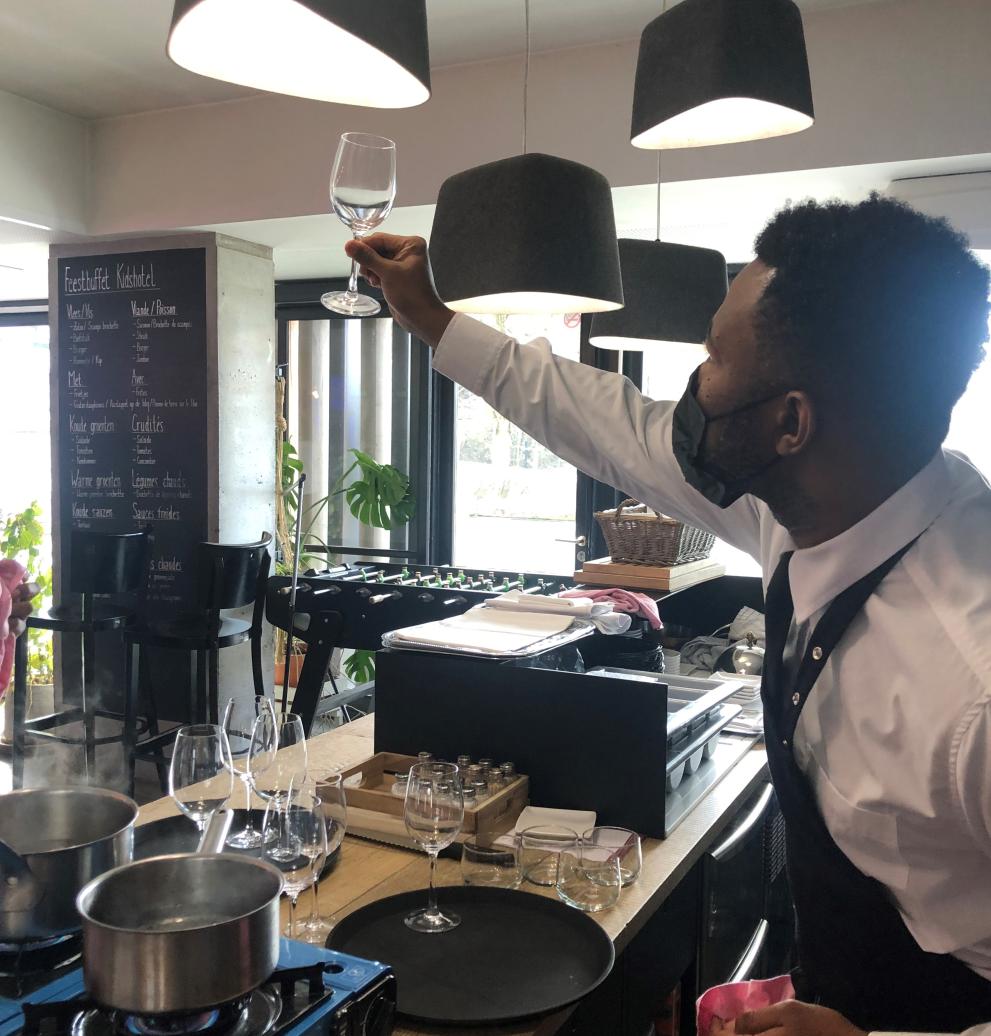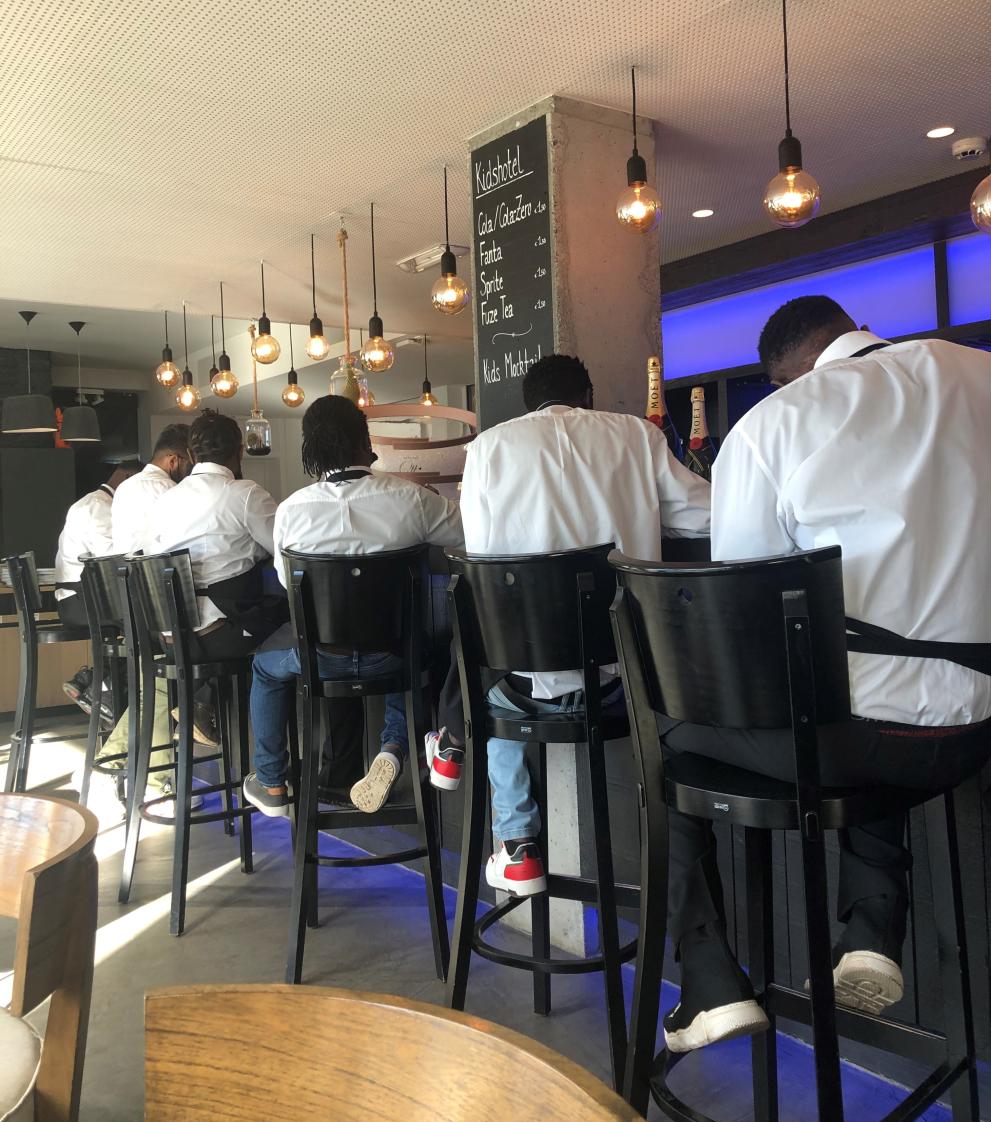A shortage of labour has prompted the Belgian government and private sector to launch initiatives that help asylum seekers fill the ever-increasing job vacancies in the country.
The combined effort among federal agencies, private companies and non-profit organisations aims to match asylum seekers’ skills with employers’ needs as they wait for their asylum applications to be processed.
The provision of vocational training programmes geared towards meeting regional needs provides participants with the chance to upskill or reskill, while getting a foot in the door in the local economy and facilitating social integration.
One pilot project currently underway in the medieval town of Durbuy in the French-speaking part of southern Belgium involves training 21 asylum seekers to work in the hotel and catering industry either as a kitchen assistant, waiter or bartender, with jobs promised to all who complete the programme.
‘A very exciting experience’
Kaddy Bojang, 34, from The Gambia is participating in a five-week training course on waitering at La Petite Merveille (LPM) Academy.
“I find the experience very exciting. I’ve never done it before. If you go to a restaurant, you think it’s easy, until you do it yourself. For me, a plate was a plate, but now I know all the different names for plates and cutlery and the different ways to serve food,” said Kaddy, who noted that the French classes were also a big help.
Kaddy has spent two years in the Hotton reception centre for asylum seekers waiting to find out whether she can stay in Belgium, in the meantime, giving birth to her son.
“It’s difficult to find work outside the centre so I get what I can at the centre,” she said.
When the LPM Academy advertised the free training programme at the centre, Kaddy took the chance. “I’m giving it my best. I need the opportunity to get some income.”
It also serves to reduce “a lot of the stress” that builds up from waiting in the asylum system. “Every day is the same in the centre. There is nothing to do. (With the training) you change environment, get fresh air, leave your stress behind and learn new things. It makes us forget,” she said.
Kaddy’s training will be followed by a 160-hour internship after which she will be offered a fixed-term contract. Should things work out for both sides, this will be replaced by a permanent contract.
An entry point to the labour market
For Aurel Christel, 42, from Cameroon, joining the training programme was a welcome relief.
“They are kind at the reception centre but there is nothing to do. It’s very hard to be in that situation,” he said.
Despite being a graduate of Business Communications and Marketing, training to be a waiter has been a positive experience.
“I can use my hands, my brain again. For sure, it will be very helpful, because I will know how things are done in Belgium, the professional code, customer relations and all that,” said Aurel.
The former marketing officer is also pragmatic about the challenges of being an asylum seeker.
“I can’t find work in my area of expertise, but the job I’m learning today allows me to keep busy and earn money for my needs… Waitering is easy for me but it’s also an entry point to a very big company,” he said.
Aurel notes that without the training, it would be hard to integrate the Belgian labour market.
LPM Academy Coordinator Yamina Marzougui notes that trainees who complete the programme receive an official diploma recognised throughout Belgium. She explained that the idea for the training programme arose out of necessity to deal with staff shortages.
“The idea came up to give asylum seekers the opportunity to get trained first, and then they are all guaranteed jobs afterwards,” she said.
Build back better through Vocational Education and Training
Apprenticeships like those offered by the LPM Academy, matching skills to labour needs through Vocational Education and Training (VET), are a key pillar of the EU’s Youth Employment Support Package, promoted with the support of the European Alliance for Apprenticeships, and helping EU efforts for recovery from the COVID pandemic, and the twin transition to a more digital and green economy.
Indeed, the experience of apprentices like Kaddy and Aurel will be celebrated alongside many others at this year’s European Vocational Skills Week (EVSW), which takes place from 16 to 20 May 2022. The Week will also highlight initiatives like the LPM Academy and their support for young people, job seekers, and asylum seekers.
The theme of this year's EVSW is ‘VET and the Green Transition’, in line with the European Commission's vision of becoming carbon neutral by 2050.
A win-win for all parties
La Petite Merveille is one of the largest hospitality and leisure enterprises in the country, employing over 340 people. According to CEO Bart Maerten, they’re always looking for new employees.
Regarding the LPM Academy, he said, “We believe that professionalisation of the sector is the key to solving the current staff shortage in our sector."
The Belgian Secretary of State for Asylum and Migration Sammy Mahdi attended the Academy’s launch in January, promoting the government’s new action plan to facilitate the employment of asylum seekers during their stay in the country.
“The Belgian labour market is struggling with an acute shortage of personnel. On the other hand, there are many people, such as asylum seekers, who would like to enter the labour market, but encounter barriers such as the need for training or skills acquisition,” he said.
“It is a win-win situation for all parties. Asylum seekers can help to solve the labour shortage and at the same time, as active citizens, they can make a positive contribution to our society,” he added.
According to Eurostat, the job vacancy rate in Belgium for the third quarter of 2021 was 4.7%, the second highest in the EU, while almost double that of the EU-27 average.
Some 25,000-30,000 asylum seekers are currently waiting for their applications to be processed in over 80 reception centres across the country.
‘We need workers’
Marie Polard from the Red Cross, responsible for reception centres in the French-speaking areas, notes that many who stay at the centres spend their time waiting to find out if they can stay in Belgium or not. Recently though, “a lot of companies, more than before, come to us saying, ‘we need workers’, so we try to connect residents with those companies.”
On paper, four months after their application, asylum seekers are given full access to the Belgian labour market. In reality, they are far removed from the opportunities available, facing difficulties that range from language skills to lack of childcare service, diploma recognition, internet or affordable transport.
State Secretary Sammy Mahdi has announced a new unit within the Federal Agency for the Reception of Asylum Seekers (Fedasil) to help match labour supply and demand through a more coordinated approach with local organisations, helping to build bridges between reception centres and the labour market.
Fedasil Coordinator Nils Baetens explained the agency has taken on a new mandate, pivoting from its traditional focus on reception of asylum seekers, resettlement and voluntary returns, to providing asylum seekers with skills they can use in Belgium for however long they will be in the country.
“Building competences is good for self-development and self-esteem,” he said, noting that even if asylum seekers end up returning to their country of origin, they go back with new skills.
“It’s good for the reception centres as it creates a better atmosphere if people are active, go to work, earn something. Also, the demand from employers is so high right now,” he noted.








